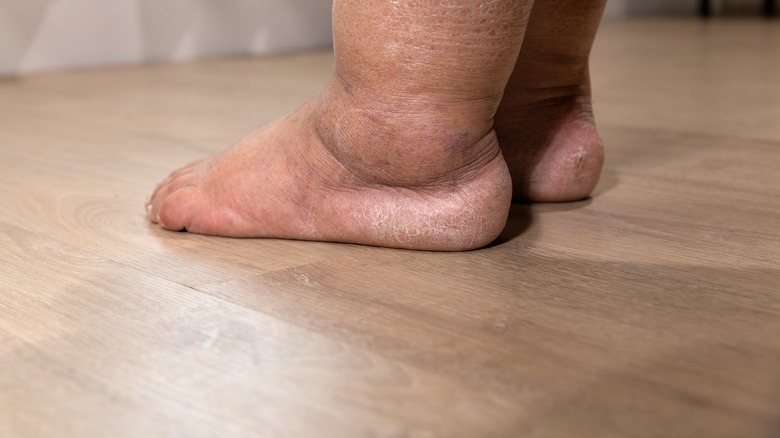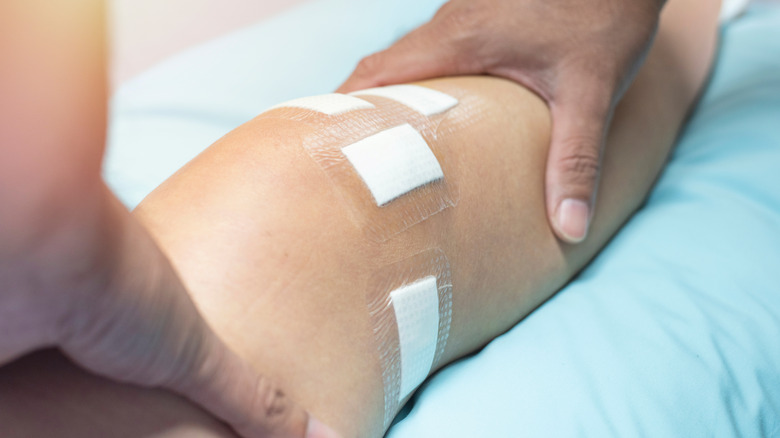What Happens To Your Legs When You Don't Eat Enough Protein
Protein is an important part of our diet and overall health. It is considered the primary component of the human body and plays a vital role in maintaining our complex bodily structure, including muscles, tissues, and vital organs. Not getting enough protein can specifically negatively impact leg health, leading to weakened muscles, impaired bone health, and symptoms like swelling and slow healing.
Protein is essential for building and repairing muscles, maintaining healthy tissues, and promoting wound healing. According to MedlinePlus, an average adult should consume 10% to 35% of their total calories from protein. For example, if you follow a 2000-calorie diet, you could consume between 50 and 175 grams of protein, as each gram of protein provides 4 calories. However, your actual protein requirement may vary based on factors like age, activity level, and overall health goals.
By learning about how protein, or a lack of it, affects your limbs, you can make informed decisions about your diet and lifestyle to help build stronger, more agile, and more resilient legs.
Protein deficiency affects leg strength and function
The muscles in your legs are some of the most important and hard-working muscles in your body. They play a vital role in helping you move around and navigate through your busy life, from your first steps as a baby to your daily activities as an adult. To keep your legs functioning at their best, it is important to ensure that your leg muscles receive a consistent supply of protein. Protein helps muscles grow and remain strong by providing the required amino acids. If you don't get enough protein, it can lead to a lack of leg strength, which can make it difficult to engage in physical activities and sports.
Not having enough protein in your diet for an extended period can lead to muscle loss and weakness (via Healthline). When you lose muscle mass, especially in your legs, it can cause several issues that impact your mobility and strength. Weak leg muscles can make it challenging to perform daily activities such as walking, climbing stairs, and maintaining balance. Over time, these limitations can increase and significantly affect your quality of life.
Protein deficiency and swelling in your legs
Protein plays a critical role in retaining water in the bloodstream, preventing it from seeping into the surrounding tissues. Thus, protein deficiency can contribute significantly to developing edema (via the Cleveland Clinic).
Edema is a medical condition marked by the abnormal accumulation of fluids in the body's tissues, primarily in the legs and feet (per the Mayo Clinic). Insufficient protein intake can lead to an imbalance in the body's fluid levels, resulting in the accumulation of excess fluid in the legs. The fluid accumulation becomes evident as swelling, which can cause discomfort and an unsightly appearance.
Edema can also cause pain, making walking, standing, or moving around comfortably challenging. Edema in the legs can also cause skin changes such as tightness, shininess, or pitting (when the skin leaves an indentation after pressing it). Severe edema can lead to ulcers and infections, which can adversely affect leg health.
The ripple effect of protein deficiency on bone health
Insufficient protein intake can cause a negative chain reaction that impacts bone health and proper nerve and muscle function. According to a 2004 report by the Office of the Surgeon General, bones are made up of a mineral-rich substance that contains calcium and phosphate. Protein is the foundation of this matrix.
Protein is not only for the development of robust bones in children but also for the maintenance of bone health in older adults. Inadequate protein consumption can lead to a cascade of issues concerning bone health, including diminished bone density, which can elevate the risk of a condition known as osteoporosis (per the International Osteoporosis Foundation).
Osteoporosis is a significant concern, particularly among older individuals, as it makes bones susceptible to fractures and breaks even with minor stresses. For those at risk of developing osteoporosis, it is important to consume sufficient protein to maintain healthy bones throughout the body, including the legs.
Protein deficiency and impaired wound healing
The process of wound healing is a remarkable display of the human body's ability to repair itself. It involves a combination of cellular and biochemical events that work together to restore damaged tissue and ensure skin integrity. This complex process is made up of different stages that work together to achieve complete healing. This process is even more critical with leg injuries or surgeries since legs are essential for mobility and daily activities.
But when your diet doesn't have enough protein, it can lead to prolonged discomfort and complications. Proteins are the building blocks that help produce collagen, a crucial structural protein vital for skin, tendons, and connective tissues. If your diet lacks enough protein, your body can't make enough collagen, and the healing process slows down (per the Cleveland Clinic).
Delayed healing can be a significant concern, especially in cases of leg injuries or surgeries. It can result in open wounds, infections, and unsightly scars. The compromised ability to heal can also prolong the recovery period and affect your leg function and mobility. Additionally, impaired wound healing can cause emotional and psychological effects, such as frustration and anxiety due to prolonged discomfort and limited mobility.
Preventing protein deficiency for healthier legs
Preventing protein deficiency is within your control through mindful dietary choices and a balanced lifestyle. Make sure to include a variety of foods that are rich protein sources in your daily meals, such as lean meats, poultry, fish, eggs, dairy products, legumes, nuts, and seeds. Aim for a well-rounded diet that includes both animal and plant-based proteins to get a diverse mix of essential amino acids.
While the recommended dietary allowance is a good guideline, your needs can vary. If you have leg-related health concerns or are recovering from an injury, it's always a good idea to talk to a healthcare professional or registered dietitian to figure out the proper protein intake for you. Sometimes, you might need to supplement your diet with protein powders or supplements, especially if you have dietary restrictions or trouble getting enough protein from food alone. Just chat with a healthcare professional before starting any supplements to ensure you're taking them safely.






